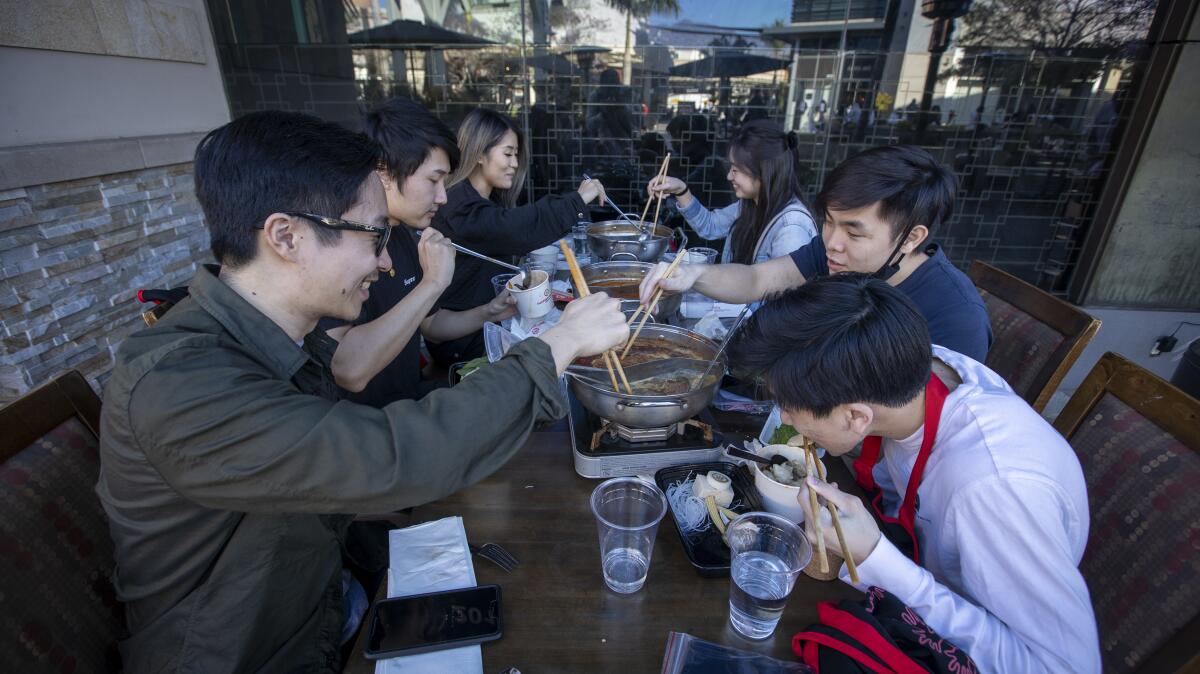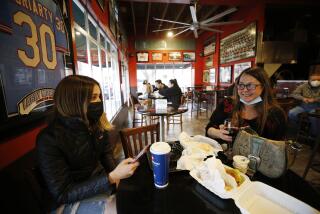When will Southern California restaurants, gyms, theme parks reopen? Here’s a timeline

Indoor dining establishments, gyms and museums can begin reopening as soon as this weekend in parts of Southern California.
But the exact timing differs by county, and some things are still up in the air.
Here is a breakdown:
What counties are reopening and when?
As early as Sunday: Thirteen counties — Los Angeles, Orange, San Bernardino, Contra Costa, Sonoma, Placer, Mendocino, San Benito, Tuolumne, Siskiyou, Amador, Colusa and Mono — will exit the purple tier, the most proscriptive of the state’s reopening blueprint, on Sunday, according to the California Department of Public Health. They are home to 17.7 million Californians, accounting for 45% of the state’s population.
As early as Wednesday: Another 13 counties — San Diego, Riverside, Sacramento, Ventura, San Joaquin, Tulare, Santa Barbara, Monterey, Kings, Sutter, Yuba, Lake and Tehama — are poised to also join the red tier as soon as Wednesday, provided their coronavirus metrics stay steady. The timing of these county reopenings are still an open question until the data are in. Those counties are home to 10.6 million Californians, accounting for 27% of the state’s population.
If all those counties exit the purple tier by Wednesday, that means 92% of Californians, or 36.2 million people, would be in the 50 counties that are not in the state’s most restrictive tier.
What is the plan in Los Angeles County?
L.A. County health officials — along with the health departments of the cities of Long Beach and Pasadena — said red-level reopenings will take effect at 12:01 a.m. Monday.
L.A. County Health Officer Dr. Muntu Davis said the decision to wait until Monday “is really to give businesses some time” to prepare and appropriately modify their operations as necessary.
“We want them to understand what the requirements are, have some time to put those things in place,” he said during a briefing Friday.
Does that include the city of Los Angeles?
Yes, the new rules apply to all cities in L.A. County.
How about Orange County?
Orange County plans to begin reopening Sunday.
In an interview Friday, Orange County Supervisor Lisa Bartlett said, “It feels like we’re finally turning the corner and people are starting to see the light at the end of the tunnel.”
“Orange County had been hovering at the 7 mark for an extended period of time, and we couldn’t really break through that,” Bartlett said, referring to the target for the rate of new daily coronavirus infections that the county had to meet to move up to the red tier. “Now we have a buffer, so even if we were to see a slight increase in cases, we would still remain in the red tier.”
And San Bernardino County?
San Bernardino is also making the shift Sunday.
“People throughout our county have worked relentlessly over the past year to protect each other’s health and safety,” San Bernardino County Supervisor Curt Hagman said in a statement. “This has been a community-wide effort involving everyone from healthcare professionals and essential workers to businesses and residents following strict public health protocols. Our diligence is now beginning to pay off.”
What does moving up to the red tier mean?
Counties in the red tier will be permitted to resume indoor dining at restaurants and movie theater showings at 25% capacity, welcome back students in person in grades 7 through 12, reopen indoor gyms and dance and yoga studios at 10% capacity, and expand capacity restrictions at nonessential stores and libraries.
Museums, zoos and aquariums also can reopen indoor operations, at 25% capacity.
Amusement parks can reopen at 15% capacity, with other modifications, starting April 1. Long-closed attractions such as Disneyland, Universal Studios, Knott’s Berry Farm and Six Flags Magic Mountain are still weeks away from again welcoming visitors — who must be California residents — after being closed for a year.
Outdoor sports — with fans — and outdoor live performances also will be allowed to resume April 1, subject to the following limitations: For counties still in the strictest tier, purple, capacity will still be limited to 100 people or fewer, and attendance will be regionally limited. Advance reservations will be required, and there will be no concession or concourse sales. In the red tier, available capacity will increase and be limited to 20%, with primarily in-seat concession sales.
Any words of caution?
Yes.
Opening more venues is not cause for Californians to let their guard down, Dr. Mark Ghaly, the state’s health and human services secretary, said during a briefing Friday. He said there is still reason to be cautious about participating in newly allowed activities, such as dining indoors at restaurants, as any venue where people aren’t wearing masks the entire time carries a risk for infection.
Mixing with people from another household, for instance, should still be done carefully, and it remains safer to dine outdoors than inside in a mixed-group setting, he said.
Davis, the Los Angeles County health officer, cautioned that eating in a restaurant’s indoor dining room still has risks and dining outdoors remains safer.
“People are susceptible to this virus. There are variants that are circulating in our county,” Davis said. “Many of those can be more easily transmitted, and some may be causing more severe disease.”
The lingering risk of dining indoors at restaurants is one reason L.A. County is requiring that those eating together live in the same household. It is permissible, however, for people from up to three households to dine at the same table outdoors.
Davis said it’s probably better for people who are at high risk for severe illness and death from COVID-19 to avoid dining inside at a restaurant.
L.A. County Supervisor Hilda Solis called the forthcoming move “welcome news” but cautioned “that in no way means we can drop our guard now,” she said in a statement. “We owe it to our neighbors, our local businesses and our children to remain vigilant so that the reopenings are safe and long-lasting. Wearing masks and physical distancing remain critical.”
Are any counties heading into the orange tier soon?
In the Bay Area, San Mateo County appears on track to head into the orange tier, the second-least restrictive, on Wednesday. In the orange tier, counties can allow bars to reopen outdoors, with modifications, without needing to serve food; capacity restrictions are lifted in stores (although pandemic safety modifications still apply); indoor places of worship, museum, zoo and aquarium capacity increases from 25% to 50%; indoor restaurant and movie theater capacity rises from 25% capacity or 100 people, whichever is fewer, to 50% capacity or 200 people, whichever is fewer; and indoor gym and yoga studio capacity rises from 10% to 25%.
What were the recent changes to breweries, wineries and distilleries?
New rules went in place Saturday governing breweries, wineries and distilleries that don’t serve food. Business as usual, however, will remain a distant concept, even in the most lenient category of the state’s four-category reopening plan.
According to new state health guidance that is effective Saturday, breweries, wineries and distilleries can operate outside without serving food in counties that are in either the purple or red tier, the two strictest. Patrons will be required to make reservations and be subject to a 90-minute time limit, and on-site consumption must stop by 8 p.m.
Breweries, wineries and distilleries that do serve food will continue to be governed by the same rules applied to restaurants.
Despite the relaxation of restrictions for some alcohol-serving establishments, bars that don’t serve food will remain completely closed in the purple and red tiers.
Though the new guidance clears the way for counties to toast the additional reopenings, it remains to be seen whether local health officers will go as far as the state allows.
The Los Angeles County Department of Public Health has not yet announced whether it will align its guidance on breweries, wineries and distilleries with the state.
Times staff writer Hannah Fry contributed to this report.
More to Read
Sign up for Essential California
The most important California stories and recommendations in your inbox every morning.
You may occasionally receive promotional content from the Los Angeles Times.












